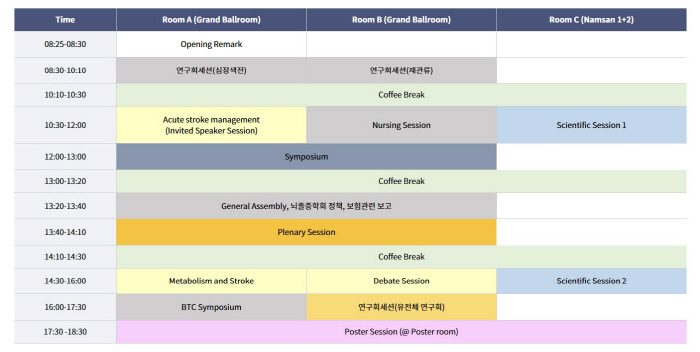The Korean Stroke Association will hold a Spring Conference on the 25th...Discussion on the introduction of mobile intensive care units
Apr 22, 2025
The Korean Stroke Association (Chairman Hwang Sung-hee, Sungkyunkwan University, Chairman Kim Kyung-moon) will hold the 2025 Spring Conference in Grand Hyatt Seoul on the 25th.
The conference will discuss the necessity and importance of introducing mobile stroke intensive care units in Korea through lectures on mobile stroke units that can help reduce the regional gap between stroke patients' golden time treatment and acute stroke treatment in Korea.
Mobile intensive care units were first installed in Germany in 2008 and are currently operating in the United States, Australia, and Europe. In Asia, it operates in India and Thailand. At this conference, Yongchai Nilanont, a professor at Thailand's Mahidol University Siriraj Hospital, plans to give a lecture on the current status of mobile stroke intensive care units in Thailand.
In the stroke precision medical session, we will discuss the possibility of customized stroke treatment based on dielectric and artificial intelligence in the era of digital innovation and also discuss ways to improve stroke precision medical care based on this. In addition, it will discuss metabolic syndrome, a major risk factor for stroke, and discuss the effects and side effects of hyperlipidemia and diabetes control drugs recently introduced in clinical practice in stroke patients in various directions.
The general meeting raises the question of the fact that over 50% of stroke patients who do not undergo surgery or procedures are classified as a general medical disease group, and more than 50% of stroke patients who are super-emergency diseases that require treatment within golden time are classified as emergency patient classification system (KTAS) 3 in emergency rooms and are on the verge of missing golden time, and sets up a meeting to discuss it in various directions to resolve it.
In addition, the Reperfusion Treatment Research Society will share and discuss the latest findings on intraarterial thrombectomy, and also discuss patient-specific antiplatelet and anticoagulant treatments in stroke patients. There is also a program for stroke nurses on the subject of neurological evaluation of stroke patients, professional nursing in stroke intensive care units, and blood pressure and blood sugar management.
The Korean Stroke Association holds an annual Spring Conference, and based on this, it has prepared a meeting to share the latest knowledge of stroke treatment at home and abroad and discuss the current status of stroke treatment in Korea, and leading research teams at home and abroad continue active exchanges.
Chairman Kim Kyung-moon (Sungkyunkwan University of Medicine) stated, "By continuing to hold academic conferences, the Korean Stroke Association will continue to play a pivotal role in the world's stroke field through active research to establish a domestic stroke system through active exchanges between stroke specialists and research teams and to provide the best treatment for stroke patients."
The conference will discuss the necessity and importance of introducing mobile stroke intensive care units in Korea through lectures on mobile stroke units that can help reduce the regional gap between stroke patients' golden time treatment and acute stroke treatment in Korea.
Mobile intensive care units were first installed in Germany in 2008 and are currently operating in the United States, Australia, and Europe. In Asia, it operates in India and Thailand. At this conference, Yongchai Nilanont, a professor at Thailand's Mahidol University Siriraj Hospital, plans to give a lecture on the current status of mobile stroke intensive care units in Thailand.
In the stroke precision medical session, we will discuss the possibility of customized stroke treatment based on dielectric and artificial intelligence in the era of digital innovation and also discuss ways to improve stroke precision medical care based on this. In addition, it will discuss metabolic syndrome, a major risk factor for stroke, and discuss the effects and side effects of hyperlipidemia and diabetes control drugs recently introduced in clinical practice in stroke patients in various directions.
The general meeting raises the question of the fact that over 50% of stroke patients who do not undergo surgery or procedures are classified as a general medical disease group, and more than 50% of stroke patients who are super-emergency diseases that require treatment within golden time are classified as emergency patient classification system (KTAS) 3 in emergency rooms and are on the verge of missing golden time, and sets up a meeting to discuss it in various directions to resolve it.
In addition, the Reperfusion Treatment Research Society will share and discuss the latest findings on intraarterial thrombectomy, and also discuss patient-specific antiplatelet and anticoagulant treatments in stroke patients. There is also a program for stroke nurses on the subject of neurological evaluation of stroke patients, professional nursing in stroke intensive care units, and blood pressure and blood sugar management.
The Korean Stroke Association holds an annual Spring Conference, and based on this, it has prepared a meeting to share the latest knowledge of stroke treatment at home and abroad and discuss the current status of stroke treatment in Korea, and leading research teams at home and abroad continue active exchanges.
Chairman Kim Kyung-moon (Sungkyunkwan University of Medicine) stated, "By continuing to hold academic conferences, the Korean Stroke Association will continue to play a pivotal role in the world's stroke field through active research to establish a domestic stroke system through active exchanges between stroke specialists and research teams and to provide the best treatment for stroke patients."
|
This article was translated by Naver AI translator.














